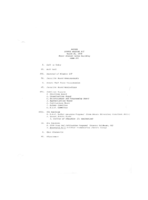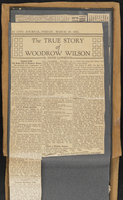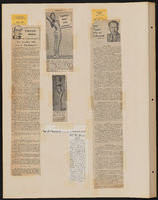Search the Special Collections and Archives Portal
Search Results
Lisa Levine (University of Nevada Regent) oral history interview conducted by Magdalena Martinez: transcript
Date
Archival Collection
Description
From the Lincy Institute "Perspectives from the COVID-19 Pandemic" Oral History Project (MS-01178) -- Elected official interviews file.
Text
Sondra Cosgrove (Vote Nevada) oral history interview conducted by Magalena Martinez and Elia Del Carmen Solano-Patricio: transcript
Date
Archival Collection
Description
From the Lincy Institute "Perspectives from the COVID-19 Pandemic" Oral History Project (MS-01178) -- Community organization interviews file.
Text

Meeting minutes for Consolidated Student Senate, University of Nevada, Las Vegas, March 20, 1979
Date
Archival Collection
Description
Text

Transcript of interview with Brian Cram by Stefani Evans and Claytee White, October 28, 2016
Date
Archival Collection
Description
Throughout his career, former Clark County School District Superintendent (1989–2000) Brian Cram took his father's words to heart. He heard them repeatedly over the years as he watched and later, helped, his father clean classrooms at Robert E. Lake Elementary School: this place—the classroom—this is the most important place. Cram was born in Caliente, where his father worked on the railroad. In 1939, when Cram was a toddler, the family moved to Las Vegas and his father found work first as a sanitation engineer at a hospital, and then at CCSD as a custodian. The elder Cram, who spent his formative years in the Great Depression, prided himself on doing "good, honorable work" as a custodian, because the work—the classroom—mattered. Even so, he wanted more for his son. Cram largely ignored his father's advice during his four years at Las Vegas High School, where he ran with The Trimmers car club, wore a duck tail and a leather jacket, and copped an attitude. Cram's swagger, though, d
Text

Transcript of interview with Marcy and Jack Simon by Barbara Tabach, May 16, 2018
Date
Archival Collection
Description
It was 1964 when Jack Simon met Marcy Stiel at a mutual friend’s wedding. Smitten from the beginning, the couple married shortly thereafter. Thus began their loving partnership that has flourished in business, community involvement, and most importantly in raising their two sons, Ron and Steven. The Simon’s can be a modest power couple. However, they are clearly capable of making things happen. When they first married, Jack was a California electrical contractor and homebuilder and Marcy became his business administrator. The Simons through their Electrical Company, Expo-Tech Electrical & Plumbing Services, Inc. won the contract to provide all of the electrical services for the entire 1984 Los Angeles Olympics, encompassing (26) twenty six venues located in California spanning from San Diego to Stanford University. The trajectory of the business was extraordinary, establishing twelve offices nationwide to provide temporary electrical and plumbing services for conventions and special events. Expo-Tech was eventually bought by industry giant GES. Their success was due in large part to Jack’s technical knowledge and Marcy’s administrative and marketing skills. With entrepreneurial zest, and over the period of eleven years, the couple found their way into the ownership of four local casinos in Elko and Wendover Nevada. Marcy was one of the first women in Nevada to hold multiple gaming licenses. In total, she held four Unrestricted Gaming Licenses. The Simons hosted Passover Seders for the Elko Jewish Community during their ownership of the casinos. In 2004, Marcy and Jack sold the four casino operations. Since moving to Nevada in 1994, the couple has made a warm and lasting impression, being generous in their focus for the well-being of the Jewish community. They are among those that actively paved the way for SB26, which outlaws government bodies from conducting business with companies that boycott Israel. They continue to be tireless advocates and philanthropists in Jewish organizations of Las Vegas and Nevada.
Text

Transcript of interview with J.W. Campbell by Raymond Haft, February 19, 1979
Date
Description
On February 19, 1979, Raymond Haft interviewed his friend, J. W. Campbell (born June 13, 1918 in Pioche, Nevada). This interview covers the history of Nevada, including Mr. Campbell’s personal history and the growth of Nevada, overall. Mr. Campbell discusses the Stewart Ranch, the Mormon Fort, swimming pools in Las Vegas, and the above ground atomic tests. He also recalls the crash of Carole Lombard’s plane and the building of the Basic Magnesium Plant in Henderson. Mr. Campbell calls Las Vegas a “One industry town,” stating that gambling (and tourism) are the main and major factors in Las Vegas, Nevada.
Text

Transcript of interview with Lt. Harry Fagel by Barbara Tabach, April 15, 2016 and January 13, 2017
Date
Archival Collection
Description
In the signature line of Harry Fagel?s emails is a reads: Be the light in dark spaces. This illumines the person that Harry is both as a police officer and a poet in Las Vegas. Harry is native Las Vegan, who has served the community with the Las Vegas Metropolitan Police Department for nearly 30 years. He currently is a police lieutenant serving in Laughlin, Nevada. In addition, Fagel is a respected poet, writing both for the public and on commission. He performs in the local poetry scene. He also has showcased his poetry in two published books, released an album, and is a recipient of the Hilliard Endowment Grant from the University Nevada, Reno. Fagel is a graduate of the University of Nevada, Las Vegas, and currently lives in Henderson with his wife, Leilani and two sons, Sam and Jake. In this interview, Fagel discusses his family background, how his grandparents came to live in Las Vegas in the 1950s, as well as his relationships with both his mother and father. He recalls his early jobs which included working for his cousin Freddie Glusman?s restaurant Piero?s and for Circus Circus-long before becoming a policeman. His involvement with the Jewish community started young and he shares how it has evolved over the decades. In addition, Fagel reflects upon his career as a law enforcement officer, the progressiveness of the Las Vegas Metropolitan Police Department, and changes in relations between the police and communities, both locally and nationally. Lastly, Fagel talks in detail about his poetry, its dominant themes, and the local poetry scene.
Text



